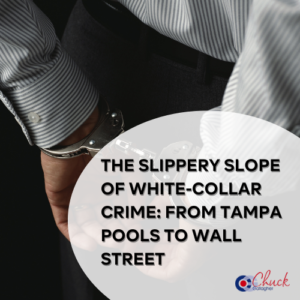 When you think of crime, you may conjure images of dark alleys, masked criminals, or high-speed chases. Yet, some of the most impactful crimes happen not in the streets but in corporate boardrooms and executive suites. White-collar crime is an insidious problem that escapes public scrutiny until it’s too late.
When you think of crime, you may conjure images of dark alleys, masked criminals, or high-speed chases. Yet, some of the most impactful crimes happen not in the streets but in corporate boardrooms and executive suites. White-collar crime is an insidious problem that escapes public scrutiny until it’s too late.
A Tampa pool company owner was recently accused of defrauding clients of more than $1.5 million. While the crime seems egregious, it highlights an alarming trend — the gradual escalation of fraudulent activities if not promptly detected or deterred.
The Growth Trajectory of Fraud
Every act of fraud begins small. Whether it’s a minor alteration in a financial report or siphoning off small amounts from client accounts, these deeds often go unnoticed. But make no mistake; fraud is like a snowball rolling downhill. The absence of immediate detection or consequences emboldens the fraudster to engage in even riskier behaviors.
Consider Bernie Madoff, the infamous investor who orchestrated a Ponzi scheme defrauding billions of dollars. His fraud didn’t start as a billion-dollar venture; it escalated over time as he became more emboldened by the lack of scrutiny and the continued influx of investor money.
Recognizing the Red Flags
In the battle against fraud, vigilance is our greatest asset. Both individual clients and companies must know the warning signs of fraud. These can include:
- Inconsistent financial statements
- Unusual surge in profits without apparent reason
- Overcomplicated explanations for simple transactions
- Unexplained business relationships
- Employee lifestyles incongruent with their salaries
Prevention is Better Than Cure
Companies need to foster a culture of ethics and compliance. They can nip fraudulent activities in the bud by implementing strong internal controls, conducting regular audits, and encouraging whistleblowers. Individuals should similarly be vigilant, scrutinizing the details of their financial statements, and not be swayed by offers that seem “too good to be true.”
What’s at Stake?
White-collar crimes may lack the dramatic flair of violent crimes, but they can be just as devastating. They erode public trust, decimate savings, and wreak havoc on the lives of countless innocent people. It’s not just about dollars and cents; it’s about the integrity of our financial systems and the social fabric that binds us all.
Are you concerned about the ethical climate within your organization? Do you worry that you or your company might fall victim to fraud? Identifying the red flags is the first step toward prevention. If you’re seeking advice or consultation on ethics and fraud prevention, feel free to reach out for speaking or consulting opportunities. Together, let’s build a more ethical and fraud-free future.


